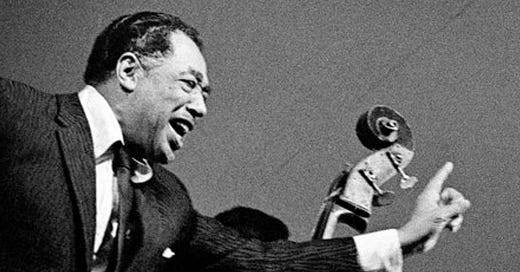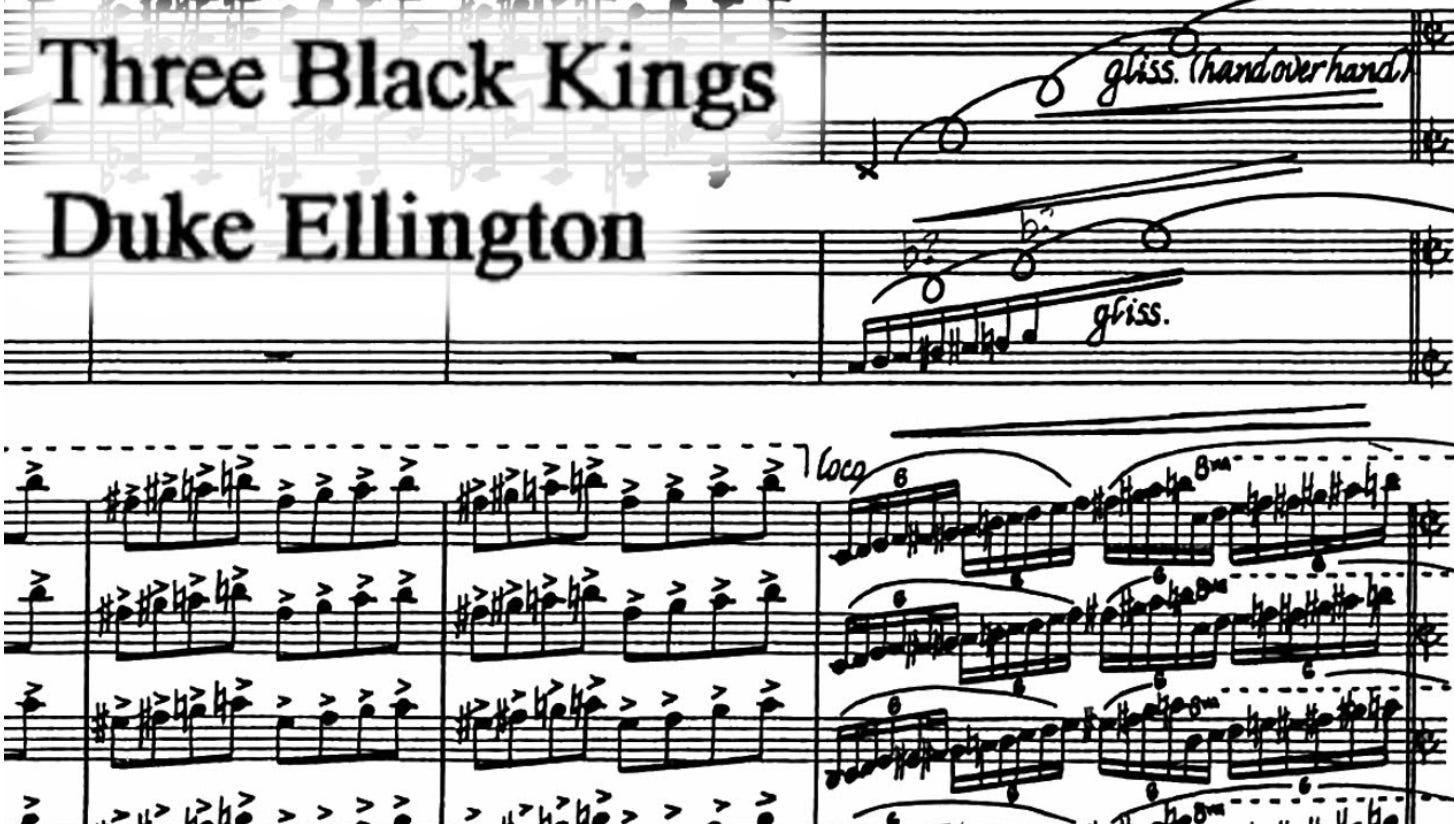The 125th DAY OF THE DUKE
“I think all the musicians in jazz should get together on one certain day and get down on their knees to thank Duke.”—Miles Davis
HAPPY DUKE ELLINGTON DAY!
Oh yes…a rightful national holiday to celebrate the birth of the greatest composer of the 20th century, Duke Ellington; Ellington, who led band after band in full-on evolutionary mode from the 1920s til the 1970s writing and recording hundreds of songs. One of the most important artists in American history. And today is extra-special, being the Duke’s 125th birthday.
“The man is a constant revelation. He’s continuously renewing himself through his music. He’s thoroughly attuned to what’s going on now. He not only doesn’t live in the past. He rejects it, at least so far as his own past accomplishments are concerned.” — Billy Strayhorn
Ellington hated being referred to as a jazz musician. He hated being pigeonholed. If you follow his career, from Harlem’s Cotton Club to the New Orleans Suite, what you get is an ever-changing pallet of the African American musical art form. Most of what is remembered by Ellington are compositions and recordings he did early in his career, which are brilliant—huge pieces of the US cultural patchwork. But up until a few months before he passed away, Ellington was touring and recording, recording and touring, constantly being exposed to and influenced by other musical traditions and cultures. It was known that The Duke composed his music based on the musicians that were around him, even updating the arrangements of old songs to fit the new band members performing them. The touring, the exposure, had a huge effect on the composer.
“He wants life and music to be always in a state of becoming. He doesn’t even like to write definitive endings to a piece.”—Clark Terry
Today, we not only celebrate 125 years since Duke’s birth, but also the time between the 50 years since his last concert performance, in Sturgis Michigan on March 22 1974, and his passing from cancer on May 24. He had been diagnosed in 1972, but never stopped working spending the final two years of his life releasing an autobiography, writing a symphony (Three Black Kings) and touring touring touring.
“Whenever I get in the hole for ideas, one of the sources I go to is Ellington’s conception of how to create colors.”—Cecil Taylor
At the Signal, we have celebrated Duke Ellington Day over the years by highlighting specific releases (here and here). We will continue that tradition today, focusing on releases from his later years.
But before we do, one anecdote. Ellington rarely fired a band member. There were musicians he might have wished were no longer working for him, but he would keep them on stage, maybe taking some limelight off, maybe helping them find new opportunities. But there was one player that he did get rid of…a new bass player in town, after he attacked band member Juan Tizol backstage at the Apollo. Tizol had commented on how the bass player, named Charles Mingus, had kept the wrong rhythm to a certain piece, and Mingus, not to be criticized, grabbed a piece of steel pipe and raised it over his head as the curtain went up for the continuation of the show (what a sight it must have been). Ellington fired him right after the curtain strolled back down.
That did not stop Ellington, years later, from recording with Mingus and drummer Max Roach, producing the excellent Money Jungle record…
Here are some great recordings from the massive Duke Ellington catalog….
Such Sweet Thunder: OK…so 1957 is more like the beginning of the later part of his career…but it is such a killer, prophesizing the groovy, cinematic work to come. Think about this project being the beat, unreleased soundtracks to Shakespeare plays. The Ellington orchestra happened to be in Canada concurrently to the Shakespeare festival..and Duke was enthralled. The title of this LP comes from a great aural quote from A Midsummer Night's Dream: "I never heard So musical a discord, such sweet thunder.”
Suite Thursday: Keeping with the literary track, this is a piece Ellington and Strayhorn wrote as a tribute to John Steinbeck’s novel Sweet Thursday, the sequel to Canary Row. Ellington wrote it to be performed at the Monterey Jazz Festival in 1960, Monterey being the backdrop to the novel.
The Afro-Eurasian Eclipse: Ellington was deeply affected by touring through Africa. The result was this incredible 1971 production (released posthumously)…up there with The New Orleans Suite, as one of his greatest achievements of his later period. SO SO good. Gary Giddins wrote a fantastic article about this record that you can find in the Ellington Reader on the Archive.org site where he talks about Ellington’s sewing of so many genres of music…including r&b and free jazz…into the fabric of this piece.
Three Black Kings: The final composition written by Ellington, focused on Balthazar, King Solomon and Matin Luther King, Jr…supposedly Ellington was still writing the symphony while dying in the hospital, dictating the ending to his son.
The Ellington Suites: Ellington composed many suites in his later years. This group of them, released posthumously, featured three of them: The Queen’s Suite, The Goutelas Suite and the Uwis Suite. Ellington wrote the Queen’s Suite in 1959 for Queen Elizabeth, pressing only one LP of the recording for her. The other two were composed in the early 70s.
Duke Ellington
By: Hans Ostrom
The headline from the Sacramento Bee
Announced that Ellington had died. I think
The article may have referred to him as one
Of those things he really was. They got
It right, if I recall: they said he was
'A treasure'-treasure lost to us, to me,
Who'd only just begun to understand
What I'd been blessed to witness when I spent
A few buck on a ticket for a concert in
A cafeteria-a break from writing essays for
My English 1-B class. I got to hear
Duke Ellington-in a junior-college cafeteria.
That night I was as privileged as a prince
Who'd seen and heard Mozart conduct.
Mere Rocklin was my Salzburg, Duke's jazz
Demotic classical. Duke Ellington had passed,
The headline said. I thought of him, spotlit
That night, a black tuxedo, and the hair
Brushed back. That's how he must have looked
As he strolled past Archangel Gabriel.
To Gabe he may have said, 'We love you madly-
But try it in a minor key this time.'
When I saw him, I was 18 and thought
I knew just what Duke Ellington deserved.
'He's royalty, ' I thought, 'does not deserve
This gig on cold linoleum.' Time is
No satin doll who puts her arms
Round you, and now I think I' may have learned
What Mr. Ellington believed that he deserved:
To write, to play, and to conduct, as long
As God would let him, and anywhere the bus
Or train or plane might go. The music does
Not know it's in the cafeteria, or in
A segregated Cotton Club. And Mr. Ellington,
The evidence suggests, could take care of himself.
Ah, heaven's black piano's always tuned.
The A-train glides like silk into the night.
In Davis, California, and in Harlem, you
Can see the sky, and hear 'Mood Indigo.'











I've come back to this a few times. Afro-Eurasian Eclipse is one of my all time faves.
Nice salute to Duke. 'Such Sweet Thunder' was the first recording of his I bought and many, many more followed.